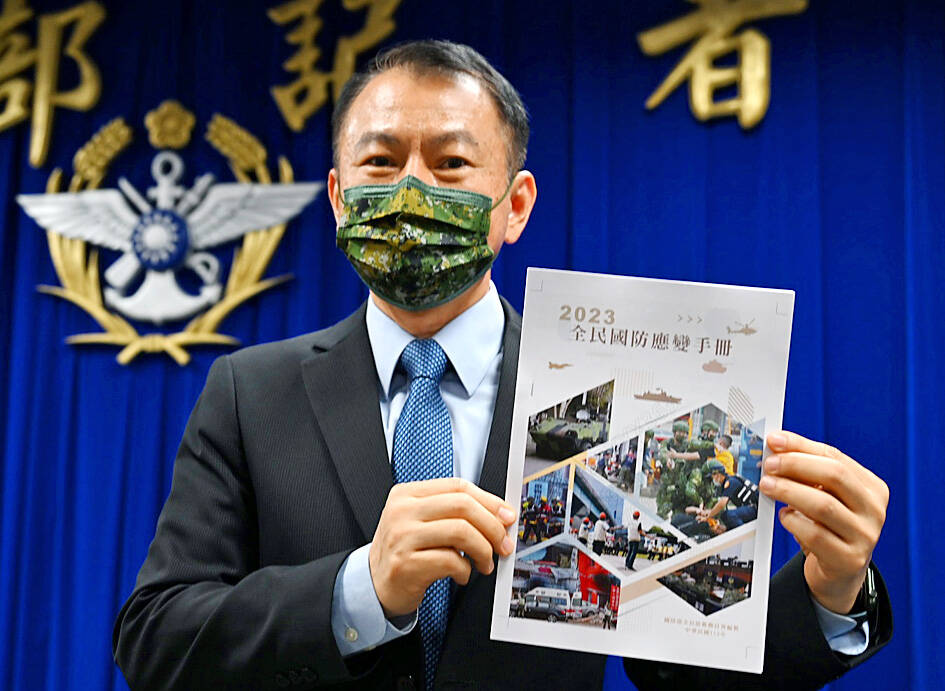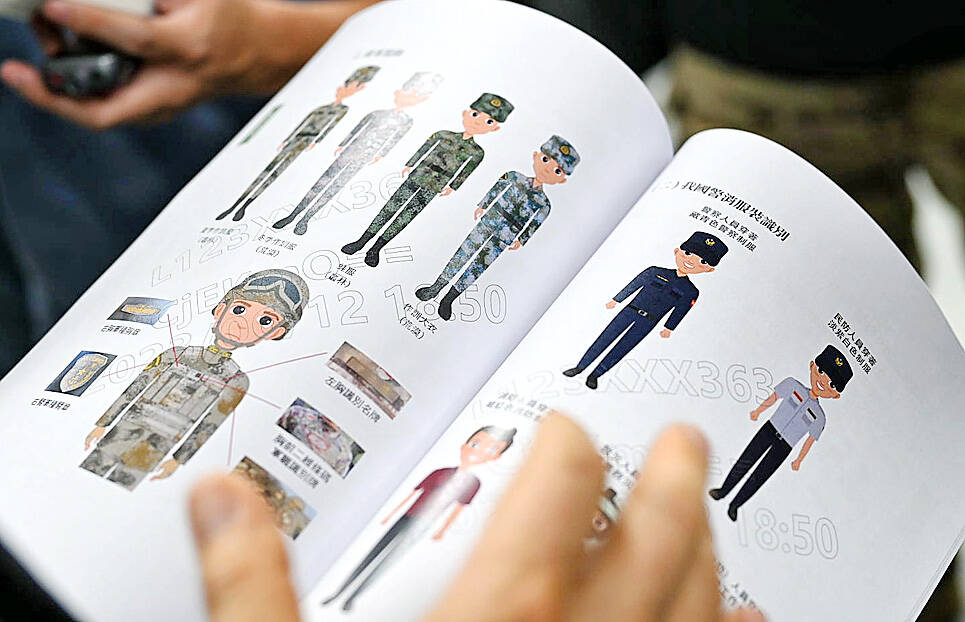A system to discern friend from foe, and instant access to accurate information are among the highlights of the latest version of the All-Out Defense Response Handbook, which the Ministry of National Defense released yesterday.
The ministry presented the handbook at a news conference in Taipei after it spent more than a year revising a version it published in April last year.
The handbook has been expanded from 28 to 48 pages, the ministry said.

Photo: Chang Chia-ming, Taipei Times
All-Out Defense Mobilization Agency Director Shen Wei-chih (沈威志) said that the handbook has two main sections: “Peacetime Preparedness” and “Wartime Response.”
“Peacetime Preparedness” covers items that should be prepared for an emergency evacuation, distinguishing air-raid alerts, knowledge of important facilities and accessing accurate information.
“Wartime Response” covers possible combat situations, including telling friend from foe; conducting an emergency evacuation; handling of water, power or food shortages and other disruptions of daily necessities; addressing communications disruptions; responding to medical emergencies; managing battlefield crises caused by fire, explosives, chemical weapons or missiles; and contacting emergency hotlines.

Photo: Chang Chia-ming, Taipei Times
The handbook shows uniforms and insignia worn by service personnel in Taiwan’s army, navy, air force and Marine Corps, as well as those worn by members of the Chinese People’s Liberation Army (PLA).
“After Russia invaded Ukraine, many have suggested that the handbook should prepare the public for severe wartime situations and offer them adequate information to respond to changes,” Shen said. “As such, we consulted similar books published in other countries, and suggestions proposed by lawmakers and experts to compile the handbook.”
The handbook has information about air-raid shelters, hospitals with emergency rooms and rationing of daily necessities, and allows people to check locations on an app, Shen said.
During wartime, it is important that people do not believe rumors about defeat or surrender by the government, he said.
Nearly 94 percent of the nation’s air defense shelters have been inspected since Aug. 8 last year, the National Police Agency’s Civil Defense and Command Control Center deputy director Lin Kuo-hua (林國華) told the news conference.
Inspections of the remaining shelters should be completed during the first half of next month, Lin said.
Of the 89,405 air defense shelters across Taiwan, 83,691 have been inspected, he said.
“We are in the process of upgrading signs for air defense shelters across the country,” he said.
“Some local governments have been asked to laminate signs to prevent water damage,” he said. “Two regions have printed signs on acrylic panels. Should funding allow, cities and counties are encouraged to use LED panels for the signs.”
As of Wednesday last week, 83.4 percent of the signs had been upgraded, he added.

MAKING WAVES: China’s maritime militia could become a nontraditional threat in war, clogging up shipping lanes to prevent US or Japanese intervention, a report said About 1,900 Chinese ships flying flags of convenience and fishing vessels that participated in China’s military exercises around Taiwan last month and in January last year have been listed for monitoring, Coast Guard Administration (CGA) Deputy Director-General Hsieh Ching-chin (謝慶欽) said yesterday. Following amendments to the Commercial Port Act (商港法) and the Law of Ships (船舶法) last month, the CGA can designate possible berthing areas or deny ports of call for vessels suspected of loitering around areas where undersea cables can be accessed, Oceans Affairs Council Minister Kuan Bi-ling (管碧玲) said. The list of suspected ships, originally 300, had risen to about

DAREDEVIL: Honnold said it had always been a dream of his to climb Taipei 101, while a Netflix producer said the skyscraper was ‘a real icon of this country’ US climber Alex Honnold yesterday took on Taiwan’s tallest building, becoming the first person to scale Taipei 101 without a rope, harness or safety net. Hundreds of spectators gathered at the base of the 101-story skyscraper to watch Honnold, 40, embark on his daredevil feat, which was also broadcast live on Netflix. Dressed in a red T-shirt and yellow custom-made climbing shoes, Honnold swiftly moved up the southeast face of the glass and steel building. At one point, he stepped onto a platform midway up to wave down at fans and onlookers who were taking photos. People watching from inside

Japan’s strategic alliance with the US would collapse if Tokyo were to turn away from a conflict in Taiwan, Japanese Prime Minister Sanae Takaichi said yesterday, but distanced herself from previous comments that suggested a possible military response in such an event. Takaichi expressed her latest views on a nationally broadcast TV program late on Monday, where an opposition party leader criticized her for igniting tensions with China with the earlier remarks. Ties between Japan and China have sunk to the worst level in years after Takaichi said in November that a hypothetical Chinese attack on Taiwan could bring about a Japanese

The WHO ignored early COVID-19 warnings from Taiwan, US Deputy Secretary of Health and Human Services Jim O’Neill said on Friday, as part of justification for Washington withdrawing from the global health body. US Secretary of State Marco Rubio on Thursday said that the US was pulling out of the UN agency, as it failed to fulfill its responsibilities during the COVID-19 pandemic. The WHO “ignored early COVID warnings from Taiwan in 2019 by pretending Taiwan did not exist, O’Neill wrote on X on Friday, Taiwan time. “It ignored rigorous science and promoted lockdowns.” The US will “continue international coordination on infectious